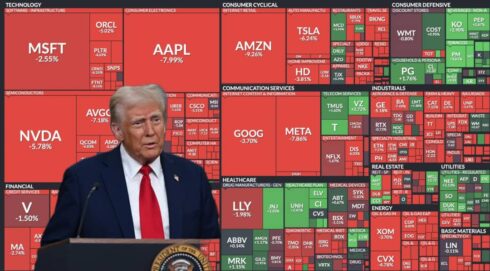Stock markets worldwide have plummeted following the announcement of sweeping tariffs by President Donald Trump, marking the steepest single-day drop for U.S. equities since the onset of the COVID-19 pandemic in 2020. The S&P 500 tumbled 4.8%, erasing nearly $2 trillion in market value, while the Dow Jones shed 4% and the tech-heavy Nasdaq collapsed by roughly 6%.
Markets in Asia and Europe followed suit. Japan’s Nikkei 225 fell 2.7%, while Australia’s ASX 200 dropped 1.6%. European indexes also recorded significant declines, with the UK’s FTSE 100 losing 1.5% amid fears of an escalating global trade war. Shares of major multinational corporations, including Nike, Apple, and Target, sank by more than 9%, signaling widespread investor panic.
Trump Defends Tariff Plan, Predicts Economic Boom
At a White House briefing, President Trump remained resolute, insisting that the new tariffs—starting at 10% but increasing significantly for certain countries—would revitalize American manufacturing and boost federal revenues. The plan includes a staggering 54% tariff on Chinese imports and a 20% duty on European goods.
“The markets are going to boom. The stock is going to boom. The country is going to boom,” Trump asserted, comparing the situation to a patient undergoing surgery for long-term health benefits. He hinted at possible trade negotiations but maintained that any counter-offer would have to be “phenomenal.”
However, economists warn that these tariffs function as a tax on imports, likely leading to higher prices for American consumers and businesses. The World Trade Organization (WTO) expressed “deep concern,” forecasting a potential 1% decline in global trade volume.
China, EU, and Canada Vow Retaliation
China and the European Union wasted no time in denouncing the tariffs, vowing to respond in kind. French President Emmanuel Macron called for European firms to suspend planned investments in the United States, while Chinese officials signaled a targeted retaliation that could impact U.S. technology and agriculture sectors.
Canada’s Prime Minister Mark Carney announced retaliatory measures, including a 25% tariff on American automobile imports. This follows earlier Trump administration tariffs on Canadian and Mexican goods, with uncertainty growing over North American trade relations.
The tit-for-tat tariff measures could significantly affect global supply chains and corporate strategies. Many firms now face the dilemma of absorbing additional costs, renegotiating supply agreements, or passing expenses onto consumers, potentially stifling demand.
Economic and Market Repercussions
The stock market turmoil extended beyond equities. The price of gold—a traditional safe-haven asset—briefly surged to a record $3,167.57 per ounce before retreating. Meanwhile, the U.S. dollar weakened against major global currencies as traders feared long-term economic slowdowns.
Investment firm Principal Asset Management projected that European economic growth could shrink by nearly one percentage point due to the tariffs, with additional losses if the EU enacts countermeasures. In the United States, Seema Shah, Chief Global Strategist at Principal, warned that the economy could tip into a recession without significant policy adjustments, such as tax cuts promised by Trump.
“The steep tariffs on imports are likely to be an immediate drag on the economy, with limited short-term benefit,” Shah said, noting that manufacturing revitalization is a long-term process, not an instant fix.
Corporate Fallout and Industry Response
The business impact of the tariffs was immediate. Automaker Stellantis announced temporary production halts at factories in Toluca, Mexico, and Windsor, Canada, in response to the 25% tax on imported vehicles. The move resulted in temporary layoffs for 900 U.S. workers across five supply plants.
Retail and consumer goods firms also bore the brunt of the market downturn. Nike, which heavily relies on Asian manufacturing, saw its stock plummet 14%. Apple, with extensive supply chains in China and Taiwan, fell 9%, while Target and Harley-Davidson both experienced double-digit percentage losses. In Europe, Adidas and Puma stocks each tumbled over 9%, while luxury brands like LVMH (Louis Vuitton Moet Hennessy) and Pandora suffered significant declines.
Financial analysts warn that further volatility is expected as investors assess the long-term implications of Trump’s aggressive trade policy. Jay Woods, Chief Global Strategist at Freedom Capital Markets, remarked, “You’re seeing retailers get destroyed right now because tariffs extended to countries we did not expect. More turbulence is likely in the coming weeks.”
As global markets reel from the shock of Trump’s tariff escalation, the full ramifications of the trade war remain uncertain. Investors and policymakers alike are bracing for a prolonged period of economic instability and geopolitical friction.














